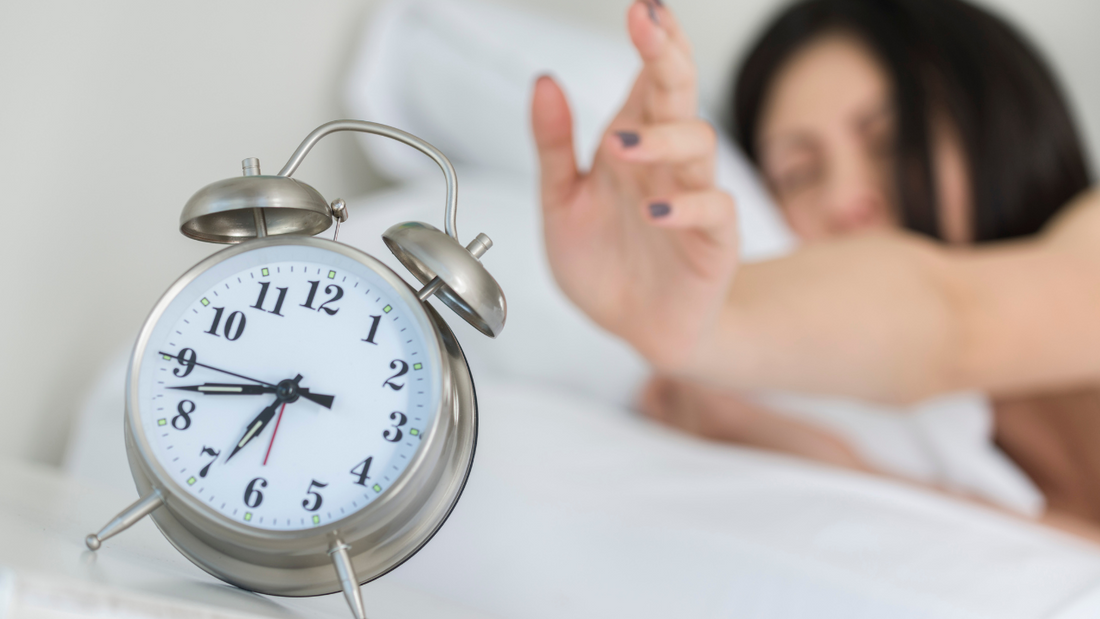
Does Snoozing Make You More Tired?
Share
For many of us, mornings begin the same way: the alarm goes off, we reach over, and… click. The snooze button buys us a few extra minutes in bed. But what happens to your body when you hit the snooze button? Does snoozing make you more tired in the long run, or is it harmless?
Let’s explore the science behind hitting the snooze button, why you might feel even groggier afterward, and how to start your mornings with more energy.
Why We Hit the Snooze Button
Snoozing your alarm can feel like a small luxury in the morning — a gentle way to delay facing the day. The snooze button was invented to give you a short burst of extra rest, usually in 5–10 minute increments.
However, those extra minutes aren’t always as restorative as they feel. When you hit the snooze button, you’re often interrupting a natural wake-up process, which can confuse your brain and body. This is why hitting snooze sometimes makes you start your day feeling more drained, not more refreshed.
What Happens When You Hit Snooze?
When your alarm first rings, your brain is transitioning from a sleep state into wakefulness. If you hit snooze and drift back to sleep, your body may start a new sleep cycle — but one that’s abruptly interrupted minutes later when your snooze alarm rings again.
This fragmented sleep can lead to something called sleep inertia, which is the grogginess you feel after waking up. Instead of easing into the day, you’re pulling yourself out of yet another incomplete sleep cycle.
In other words, hitting the snooze button can confuse your body’s internal clock, making you feel more sluggish. That’s one big reason why hitting snooze is bad for you if your goal is to wake up energized.
Why Snoozing Might Make You More Tired
So, does snoozing make you more tired? In most cases, yes — and here’s why:
-
You re-enter lighter stages of sleep
After your alarm goes off, you may slip into Stage 1 or Stage 2 sleep again. Waking up from these stages can still leave you groggy, especially if you repeat the snooze cycle multiple times. -
You disrupt your body’s natural cortisol rise
Your body releases cortisol in the morning to help you feel alert. Snoozing alarm patterns can interfere with this rhythm, delaying the natural wake-up process. -
You confuse your circadian rhythm
Your internal clock thrives on consistency. Hitting snooze multiple times sends mixed signals, making it harder to feel alert when you finally get out of bed.
The Science of Hitting Snooze
Some studies have found that while short snoozes may not be harmful for everyone, frequent snooze button use is linked to poorer sleep quality and reduced morning alertness.
Researchers found that people who regularly hit snooze often also reported staying up later, having irregular sleep patterns, and experiencing excessive sleepiness during the day.
While the snooze habit might feel harmless, the evidence suggests that over time, it can worsen morning tiredness and contribute to chronic sleep disturbances.
Why You Shouldn’t Hit Snooze Every Morning
If you often wake up tired despite spending enough time in bed, the snooze habit may be part of the problem. Here’s why you shouldn’t hit snooze as a daily practice:
-
It prolongs grogginess: Sleep inertia can last longer when your wake-up is fragmented.
-
It reduces restorative sleep: Those extra minutes are too short for meaningful restorative sleep.
-
It delays your start: Mentally, snoozing can make mornings feel rushed and less intentional.
Don’t hit the snooze button if your goal is to feel energized right away. Instead, aim for a wake-up routine that minimizes grogginess and maximizes alertness.
Healthy Alternatives to the Snooze Button
If snoozing alarm time has become part of your daily ritual, breaking the habit might take some adjustment. Try these strategies instead:
-
Set your alarm for the time you actually need to wake up
Instead of building in snooze time, aim for one solid wake-up. -
Use a sunrise alarm clock
These simulate natural light, helping your body wake up more gradually and comfortably. -
Place your alarm across the room
This forces you to physically get out of bed to turn it off. -
Improve your sleep hygiene
Stick to a consistent sleep schedule, keep your room dark and cool, and limit screens before sleep.
When Snoozing Isn’t the Real Problem
Sometimes, the need to hit snooze is a symptom, not the cause. If you’re still tired after sleeping 8 hours or find yourself waking up exhausted regularly, it could be due to:
-
Sleep deprivation (not getting enough total sleep)
-
Poor sleep quality from environmental factors like noise or light
-
Sleep disorders such as sleep apnea or insomnia
-
Chronic fatigue or other underlying health conditions
If you’ve improved your morning routine but still feel drained, it’s worth talking to a healthcare professional.
Final Thoughts: Is Snoozing Bad for You?
So, is it bad to snooze your alarm? For occasional use, probably not — especially if it’s a one-off after a late night. But as a daily habit, snoozing alarm time can disrupt your sleep, delay your natural wake-up process, and leave you feeling more tired.
Your best bet is to focus on a sleep routine that ensures you wake up ready to start the day without relying on the snooze button. The fewer times you hit snooze, the better chance you have of starting your morning with clarity and energy.
Bottom line: Snoozing may feel comforting in the moment, but over time, it’s a false friend. Skip the snooze, get up with your first alarm, and give your day the energized start it deserves.
